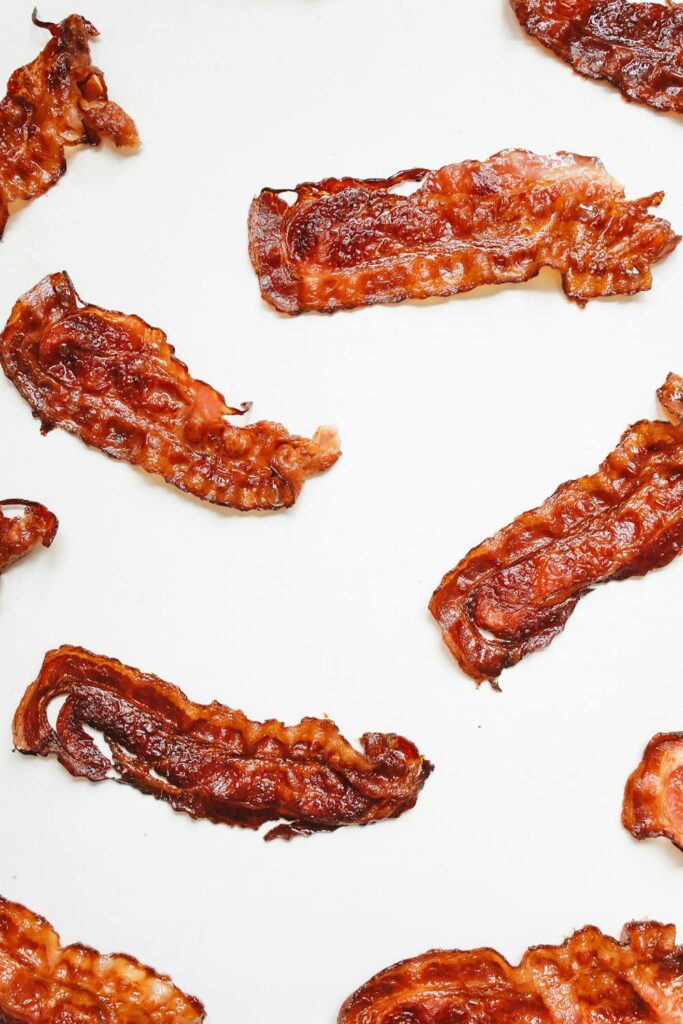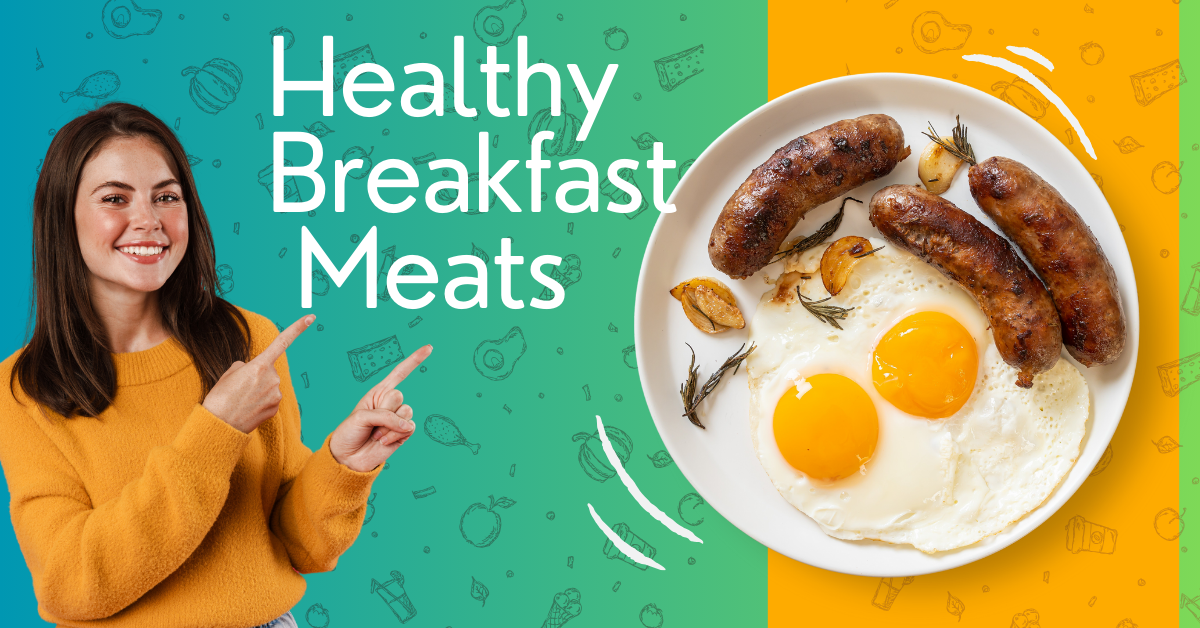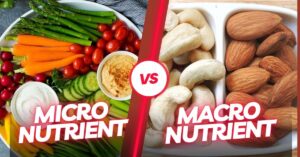Table of Contents
Toggle1. Introduction:
Out of all the meals, breakfast should be noticed as it is the most important meal of the day. However, it is not easy to say that all breakfasts are healthy. In fact, for those who want to feel healthy in the mornings but still eat something hearty, healthy breakfast meats may be a desirable option. They include lean proteins that help satisfy hunger pangs and protein-rich options with various beneficial nutrients. Thus, avoiding adding meat to the morning meals is unnecessary.
In this article, I will highlight the twelve best healthy breakfast meats you can eat and their importance in health so that you can have enough energy and focus to face the day.
2. Why Choose Meat for Breakfast?
Adding meat to breakfast isn’t simply a matter of preference but also a tactical decision for health-oriented people. This is why eating a healthy breakfast with meat can be beneficial in the morning.
Nutritional Benefits:
Meats such as pork, chicken, and beef have valuable nutrients every human needs for good health. They are mostly composed of protein, which is very important for the repair of muscles, boosting immunity, and general upkeep of the body. Also, meat has a good supply of iron, which is important to stave off weariness. As for the concern about B vitamins, the major one being B12, they can be obtained abundantly from meats, which is good for the brain and the production of red blood cells.
Satiation and Energy:
Including healthy breakfast meats in your diet has its benefits, one being their ability to keep you satisfied for a long time. Lean, protein-rich foods such as meat take longer to be digested, preventing the sharp drop in blood sugar levels often encountered in many individuals after a mid-morning meal. Productive energy means that you can concentrate and is effective once you eat the next meal.
Versatility:
One of the further benefits of breakfast meats is that they are highly versatile. For instance, there’s bacon made of turkey for the more conventional consumer, and for some, there’s even smoked salmon for those less sensitive to meats. This flexibility allows healthy meats to be added to various breakfast options- wraps, sandwiches, omelets, and salads.
3. Top Healthy Breakfast Meats:
The other secret is knowing which meats would best suit breakfast since not only will they add flavors, but they will also add nutritional value to the meal. If you want your morning meal to include some varieties of meat, then below are some of the best healthy breakfast meats that you will not have trouble integrating into your daily routine.
1. Turkey Bacon:

Nutritional Profile: Most tired consumers of original pork bacon turn to turkey bacon. It is small in fat and calories and is all for protein; hence, the dieter gains everything out of where such meat is consumed.
Preparation Tips: To fully enjoy it as intended, fry the turkey bacon crispy but not too much as this may dry the meat. Medium heat is ideal.
Pairing Ideas: Serve turkey bacon with whole grain toast and some avocado or nut butter for a meal with healthy carbs, protein, and good fats.
2. Chicken Sausage:
Nutritional Profile: Chicken sausage is healthier than pork sausage and is a good source of lean protein. It is also generally low in saturated fats, thus being pleasant for the heart.
Preparation Tips: Chicken sausages can be cooked by grilling, baking, or pan-frying. Try cooking it with rosemary or thyme to up the flavors.


Pairing Ideas: Enjoy a breakfast of chicken sausages and green scrambled eggs, or use the sausages in a stir-fry of vegetables for a healthy and delicious breakfast.
3. Lean Ham:
Nutritional Profile: Ham is a protein primarily low in fat and rich in proteins. It also has the amino acids required for tissue repair and health maintenance.
Preparation Tips: You can heat the ham slices in a pan or oven for a minute. You may wish for some bouncing taste honey-mustard glaze on them.
Pairing Ideas: Take lean ham in a whole-grain wrap or take it with fresh fruits and enjoy a sweet breakfast.
4. Salmon:


Nutritional Profile: Salmon is a rich source of protein and non-saturated fats, especially omega-3 fatty acids, which are very good for the heart. It is one of the best nutrient-packed things you can have for breakfast.
Preparation Tips: Smoky or even grilled salmon can help improve your breakfast. Using ready-to-eat smoked salmon is the best in this case.
Pairing Ideas: Salmon can be served with a wholegrain bagel and a thin smear of cream cheese or in a breakfast burrito with eggs for a lavish start to the day.
5. Canadian Bacon:
Nutritional Profile: Furthermore, Canadian bacon is a much-jerked form of bacon that replaces its purpose ravenously yet takes in fewer calories and less fat.
Preparation Tips: Canadian bacon slices should be heated in a skillet on medium heat, turning once after a few minutes.
Pairing Ideas: Use Canadian bacon and pair it with an English muffin, or for breakfast, put the bacon in between two slices of bread with an egg and cheese.
These healthy breakfast meats guarantee not only several tastes but also nutrition. Such breakfasts with meat can be either traditional or quite extraordinary. However, they will be helpful in the morning, giving the body the needed protein and energy. Next, we will look at a few healthy meats for those who love vegetarian or vegan options.
4. Plant-Based Meat Options:
Overview: The rise in popularity of plant-based diets has led to various meat alternatives that mimic the taste and texture of traditional meats while offering their unique nutritional benefits. These alternatives are often made from soy, peas, or other plant proteins and are designed to provide a similar protein content to animal meats.
Nutritional Comparison: While plant-based meats may have slightly different nutritional profiles than animal meats, they often contain comparable protein levels, making them an excellent option for those seeking to maintain muscle mass and energy levels. Additionally, many plant-based options are lower in saturated fats and free from cholesterol, making them heart-healthy choices.
1. Tofu
Nutritional Profile: Tofu is a versatile and protein-rich meat alternative made from soybeans. It’s low in calories, high in protein, and contains all nine essential amino acids, making it a complete protein source.
Preparation Tips: Tofu can be scrambled, grilled, or baked. For breakfast, try making a tofu scramble seasoned with turmeric, garlic powder, and your favorite vegetables for a hearty, protein-packed start to your day.
Pairing Ideas: Pair tofu scramble with whole-grain toast or wrap it in a whole-wheat tortilla for a convenient breakfast burrito.
2. Tempeh:
Nutritional Profile: Tempeh is another soy-based product, but it’s fermented, which makes it richer in protein and probiotics. It has a firmer texture and a slightly nutty flavor, making it a great meat substitute.
Preparation Tips: Tempeh can be sliced thin, pan-fried, or crumbled and added to breakfast bowls. It absorbs flavors well, so marinating it in soy sauce, maple syrup, and spices before cooking can enhance its taste.
Pairing Ideas: Serve tempeh with sautéed greens and a poached egg, or add it to a veggie-packed breakfast bowl for a nutritious start.
3. Plant-Based Sausages:
Nutritional Profile: Made from various plant proteins, such as pea protein, these sausages are designed to mimic the taste and texture of traditional meat sausages. They are typically lower in fat and calories and can be a good source of protein.
Preparation Tips: Cook plant-based sausages like regular sausages—grill, pan-fry, or bake them. They’re perfect for adding a savory element to your breakfast.
Pairing Ideas: Enjoy plant-based sausages with scrambled eggs or roasted vegetables for a filling and balanced meal.
4. Seitan
Nutritional Profile: Seitan, made from wheat gluten, is a high-protein, low-fat meat alternative. It has a chewy texture similar to meat and is incredibly versatile.
Preparation Tips: Seitans can be sliced and pan-fried or added to stir-fries. It’s best when marinated or cooked in a flavorful broth to enhance its taste.
Pairing Ideas: Serve seitan with a side of whole grains or add it to a breakfast sandwich for a protein-packed start to your day.
Incorporating these healthy meat alternatives into your breakfast can offer a nutritious and satisfying way to enjoy protein benefits without relying on animal products. Whether you’re a vegetarian, vegan, or simply looking to diversify your breakfast options, these alternatives provide plenty of delicious possibilities.
5. Incorporating Healthy Breakfast Meats into a Balanced Diet:
Adding healthy breakfast meats to your morning routine is a great start, but ensuring that these meals are balanced and nutritious is equally important. Here are some tips on how to effectively incorporate these meats into a well-rounded breakfast:
Portion Size:
Breakfast meats are often abundant in protein and other essential nutrients. However, portion control is critical in this case. Even with lean cuts, excessive meat consumption is still too much in calories and saturated fat. A rough fit within that will get satisfied in one meal is about 3-4. Sufficient size allows one to consume meat with all the proteins and other nutrients without excessive calorie intake.
Balancing with Other Food Groups:
Though healthy breakfasts skip breakfast first, most people need to take sufficient protein food and all the food groups in case all. This point, when paired with healthy breakfast meats consuming whole grains, fruits, and vegetables, will provide a balanced diet with even more vitamins and minerals to the body. For instance, turkey bacon, whole grain graduates, fresh berries are served in the ear, or grilled salmon with avocado and a slice of whole grain. Just ensure that not all nutrients come from one food source.
Short Recipes:
There is no need to make things difficult when adding healthful breakfast meats to your dishes. Here is how you can make some effortless and quick recipes that must be a part of a healthy breakfast:
Turkey Bacon Avocado Toast: Take a slice of fresh whole-grain bread and toast it; Mash and spread ripe avocados on top and place crispy beef rashers on it—season with salt and pepper.
Chicken Sausage Vegetables & Eggs: In a pan, sauté diced chicken sausage with bell peppers, spinach, and onion. Incorporate whisked eggs and wait until they are cooked. Accompany with whole-grain toast.
Salmon Egg Bowl: Begin with a base of quinoa or brown rice upon which you flake grilled salmon or add some poached eggs or sautéed spinach with a lemon dressing.
These recipes take little time to prepare and are necessary to ensure that the body consumes all important nutrients throughout the day.
Any meat can be included for breakfast, but precautions should also be taken where other considerations come into play. With these tips and recipe ideas, you can have these foods in a healthy overall and enjoyable breakfast routine, which assures you of great health benefits.
6. Common Mistakes to Avoid:
Even when embracing healthy breakfast meats in your meals, other threats loom. Here are some common mistakes to avoid and make sure that your breakfast is kept nutritious and well-rounded:
Overconsumption:
One of the threats when it comes to meat is overindulging. Of course, if they are that delicious, some people will consume more than necessary, even getting more breakfast meats than the body can handle. There are healthy breakfast meats, but too much consumption of these can also lead to over-energy intake and saturated fat intake, jeopardizing one’s target health. Regarding these meats, only other food groups such as whole grain, fruits, and vegetables could balance meals, requiring these portions per serving suggested to be 3-4 ounces.
Choosing High-Fat Meats:
Like any other product, not all meats are the same. Processed meats, such as mediocre bacon, sausage, or preserver-ed ham, are filled with salty and saturated fats and preservatives, leading to many other states, such as heart disease. You can still enjoy your breakfast without your meaty foods becoming a liability on the body by swapping to turkey bacon, chicken sausage, or lean ham.
Vegetable Deficiency:
Most, if not all, people never incorporate vegetables even in their breakfast, but the facts are in order. Veggies are essential for providing fiber, vitamins, and minerals, which are vital for good health. Let that be the case, but assume you also have some healthy breakfast meats, then you have to add a portion of veggies like sauteed spinach, tomatoes, and bell peppers. This not only improves the nutritional diversity of the breakfast but also livens up the plate with color and taste.
Restriction in Different Breakfast Typography:
It is fine to have the best do-it-yourself breakfast burrito from scratch jacket with ‘sp’ every day; however, having a single breakfast meal every day may sometimes cause deficiencies. Do not be lazy; how I love this bacon meat and sausage meat, combined with other already described different side dishes to avoid them all. For example, for meat, have turkey bacon for two days, salmon for the next two days, and chicken sausage for the last two days of the week. Add other types of vegetables, fruits, or even grains to make your breakfast habit nutritious and very interesting.
As such, it is important to learn to spot these adverse habits and correct them so that breakfast is not the day’s argument. It is essential to remember that moderation and variety are fundamental in enabling one to eat healthily.
7. Conclusion:
Adding healthy meats for breakfast is a great way to enhance your daily protein intake, promote muscle development, and give enough energy to last through the day. Whether it is savory or spicy, a delicious salmon fish richness lean turkey bacon on seasonal cravings, or chicken sausage, any Weight Watchers can relish, there are many meat options to choose from. A healthy and sustaining breakfast can be achieved when these meats are served with whole grains, fruits, and vegetables in an appropriate portion.
To summarise, remember that balance is essential in any diet. There is no need to be too boring; feel free to try out new cuisines and recipes and break the monotony of meals. With a focused outreach, nutritious meats can be a key deterrent in an overall health-inducing breast, helping you remain committed to your health objectives.
8. FAQS:
Q1: Are all meats healthy for breakfast?
Not all meats are ideal for breakfast. Choosing lean meats like turkey bacon, chicken sausage, and salmon over processed and high-fat options like traditional bacon or pork sausage is important. Lean meats are lower in saturated fats and calories, making them healthier.
Q2: Can vegetarians or vegans include ‘meat’ in their breakfast?
Vegetarians and vegans can enjoy plant-based meat alternatives like tofu, tempeh, and plant-based sausages. These options offer similar protein benefits without animal products, making them a great addition to a vegetarian or vegan diet.
Q3: How often should I eat meat for breakfast?
Moderation is key. It’s okay to include healthy breakfast meats several times a week, but it’s important to balance your diet with various other foods, such as whole grains, fruits, and vegetables. This ensures you get a wide range of nutrients and do not over-rely on any food group.
Q4: What are some quick and healthy breakfast meat recipes?
: Some quick and healthy options include turkey bacon and avocado toast, chicken sausage, veggie scramble, and salmon and egg breakfast bowls. These recipes are easy to prepare and provide a balanced mix of protein, healthy fats, and other essential nutrients.
Q5: Is eating processed meats like bacon and sausage for breakfast okay?
: While it’s best to limit the intake of processed meats, healthier versions like turkey bacon or chicken sausage can be a better choice. These alternatives are lower in saturated fats and calories, making them a more nutritious option for breakfast.











